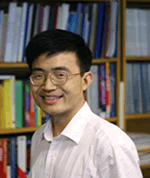 |
New York UniversityWebsite: http://eeweb.poly.edu/faculty/jiang/Email: |
Zhong-Ping JIANG (M’94, SM’02, F’08) received the B.Sc. degree in mathematics from the University of Wuhan, Wuhan, China, in 1988, the M.Sc. degree in statistics from the Universite de Paris-sud, France, in 1989, and the Ph.D. degree in automatic control and mathematics from the Ecole des Mines de Paris, France, in 1993.
Currently he is a Professor of Electrical and Computer Engineering at the Polytechnic Institute of New York University (formerly called Polytechnic University). His main research interests include stability theory, the theory of robust and adaptive nonlinear control, and their applications to underactuated mechanical systems, congestion control, wireless networks, multi-agent systems and Systems Physiology.
Dr. Jiang has served as a Subject Editor for the International Journal of Robust and Nonlinear Control, and as an Associate Editor for Systems & Control Letters, IEEE Transactions on Automatic Control and European Journal of Control. Dr. Jiang is a recipient of the prestigious Queen Elizabeth II Fellowship Award from the Australian Research Council, the CAREER Award from the U.S. National Science Foundation, and the Young Investigator Award from the NSF of China. He (together with coauthor Yuan Wang) received the Best Theoretic Paper Award at the 2008 World Congress on Intelligent Control and Automation, June 2008, for the paper “A Generalization of the Nonlinear Small-Gain Theorem for Large-Scale Complex Systems”.
Dr. Jiang is a Fellow of the IEEE and a Cheung Kong Professor at Beijing University.
Network Stability and Control
Dynamic networks are ubiquitous in many branches of engineering and science. Examples of such kind include groups of robots working in a team, smart grid, transportation networks, wired and wireless communication networks, social-economic systems and biological cell networks. A common feature shared by these dynamic networks is that their many components need to function cooperatively in order to achieve the best possible functionality and performance. Stability is one of the most fundamental and important properties for dynamic networks. The primary objective of this talk is to revisit advanced stability theory for dynamic systems and to report on recent developments in stability of complex large-scale systems. A special focus will be on input-to-state stability for networks of input-to-state stable (ISS) systems, in the framework of nonlinear small-gain theorems. In a series of recent contributions by us and others, it is shown that small-gain is a powerful tool for addressing stability properties of dynamic networks described by mathematical models of various kinds such as ordinary differential equations, coupled differential-difference equations, and hybrid/impulsive systems. More interestingly, Lyapunov functions for the total network can be constructed on the basis of Lyapunov functions for isolated subsystems. In the second part of the talk, we aim to address control design issue for dynamical networks to ascertain desirable stability properties. Novel tools for quantized feedback control of important classes of nonlinear systems will be given by means of small-gain techniques reported in the first part of the talk. Problems arising from macro economics, mathematical biology (bioreactor) and networked control systems will be used as illustrative benchmark examples for our research.